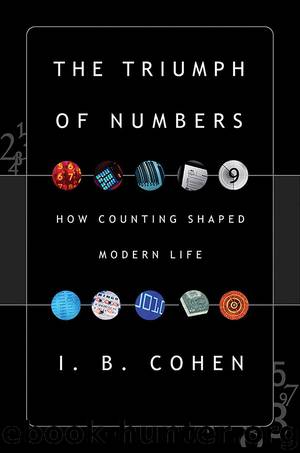The Triumph of Numbers by I. Bernard Cohen

Author:I. Bernard Cohen
Language: eng
Format: epub
Publisher: W. W. Norton & Company
Published: 2015-04-25T16:00:00+00:00
NEW USES FOR NUMBERS: INNOVATIONS BY CONDORCET AND LAPLACE
The late eighteenth and early nineteenth centuries witnessed tremendous advances in the mathematical theory of probability, the mathematics used to analyze statistical data. This new science ultimately gave rise to a variety of spin-off disciplines that altered our daily life. Two contributors to the development of the theory of probability were Condorcet and Laplace.
Antoine de Caritat, Marquis de Condorcet (1743–1794), was a mathematician and a social theorist. He was a friend of Benjamin Franklin’s and of Thomas Jefferson’s, both of whom had contact with him in his role as secretary of the French Academy of Science.
Like Lavoisier, Condorcet was an enthusiastic supporter of the French Revolution in its early stages. But as the Revolution turned into the Terror, Condorcet, like Lavoisier, was condemned and died on the guillotine. Yet Condorcet, while awaiting certain arrest and inevitable death, wrote one of the most optimistic books ever written about the future of mankind. This philosophical masterpiece, Esquisse d’un tableau des progrès de l’esprit humain, was published posthumously by his wife.
Pierre-Simon, Marquis de Laplace (1749–1827), was the most important mathematician since Isaac Newton. He was a gifted contributor to both pure and applied mathematics, and it was he who transformed Newton’s “rational mechanics” into “celestial mechanics” with his treatise Mécanique céleste (1799–1825). Laplace made many important contributions to probability theory and wrote a very influential book on the philosophy of probability, Théorie analytique des probabilities (1812).
Laplace applied the theory of probability to judicial voting. Whereas in the British system of law, a unanimous vote of a jury of 12 was required to establish guilt, in France a simple majority would suffice. Laplace believed that the British system implied a bias toward the protection of society and that the French system was unjust to the accused. He recommended a compromise, requiring the agreement of 9 out of 12 jurors, which he thought would provide a better system of justice.
The history of the development of the theory of probability is beyond the scope of this book. Our interest here is in numbers, and in this field Condorcet has been noted for his use of the new science of probability to analyze the voting process. But perhaps his most important contribution was to have made Laplace aware of this problem.39
So in place of a discussion of probability, we must turn our attention next to the politically even more consequential emergence of the new science of statistics.
Download
This site does not store any files on its server. We only index and link to content provided by other sites. Please contact the content providers to delete copyright contents if any and email us, we'll remove relevant links or contents immediately.
| Biomathematics | Differential Equations |
| Game Theory | Graph Theory |
| Linear Programming | Probability & Statistics |
| Statistics | Stochastic Modeling |
| Vector Analysis |
Modelling of Convective Heat and Mass Transfer in Rotating Flows by Igor V. Shevchuk(6432)
Weapons of Math Destruction by Cathy O'Neil(6264)
Factfulness: Ten Reasons We're Wrong About the World – and Why Things Are Better Than You Think by Hans Rosling(4731)
A Mind For Numbers: How to Excel at Math and Science (Even If You Flunked Algebra) by Barbara Oakley(3301)
Descartes' Error by Antonio Damasio(3270)
Factfulness_Ten Reasons We're Wrong About the World_and Why Things Are Better Than You Think by Hans Rosling(3230)
TCP IP by Todd Lammle(3180)
Fooled by Randomness: The Hidden Role of Chance in Life and in the Markets by Nassim Nicholas Taleb(3105)
The Tyranny of Metrics by Jerry Z. Muller(3065)
Applied Predictive Modeling by Max Kuhn & Kjell Johnson(3064)
The Book of Numbers by Peter Bentley(2964)
The Great Unknown by Marcus du Sautoy(2690)
Once Upon an Algorithm by Martin Erwig(2641)
Easy Algebra Step-by-Step by Sandra Luna McCune(2628)
Lady Luck by Kristen Ashley(2576)
Police Exams Prep 2018-2019 by Kaplan Test Prep(2540)
Practical Guide To Principal Component Methods in R (Multivariate Analysis Book 2) by Alboukadel Kassambara(2538)
All Things Reconsidered by Bill Thompson III(2389)
Linear Time-Invariant Systems, Behaviors and Modules by Ulrich Oberst & Martin Scheicher & Ingrid Scheicher(2364)
